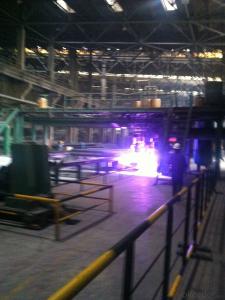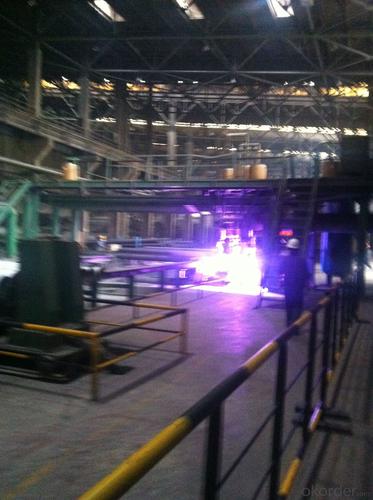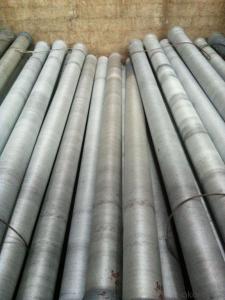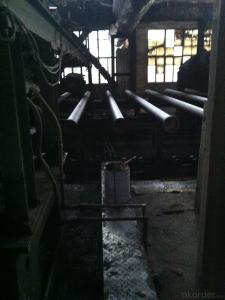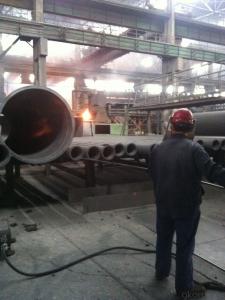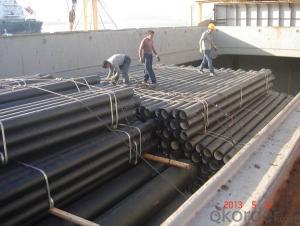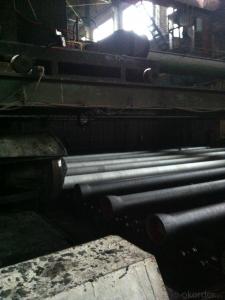DUCTILE IRON PIPES AND PIPE FITTINGS K7 CLASS DN900
- Loading Port:
- Tianjin
- Payment Terms:
- TT OR LC
- Min Order Qty:
- 22 pc
- Supply Capability:
- 3000 pc/month
OKorder Service Pledge
OKorder Financial Service
You Might Also Like
Material : Ductile Cast Iron
Size Range : DN 80mm to DN 2000mm
Unit Effective Length : 6m or 5.7m
Manufacture Standard: ISO 2531:1998/ EN 545:2006/EN 598:2007
Annual capacity : 200,000 tons
Coating Exterior: Zinc 130g/m2 according to ISO 8179-1 and bitumen coating 70 microns.
Cement Interior: Portland Cement/ High Alumina Cement/ Sulphate Resisting Cement Lining according to ISO 4179
Special requirements on external coating and internal lining can be applied
We also provide accessories such as SBR/EPDM rubber gaskets, lubricant paste, pipe caps, PE sleeves, etc.
Additional Parts:
Each pipe is strictly inspected according to related standard to ensure permanently high performance.
Easy Installation at site and service free for life
Long Service Lifespan
Quotation will arrive you within 24hours once we get your inquiry.
We guarantee offering you a competitive price.
A copy of original inspection reports of pipes will be offered after shipment.
Photos of loading process will be sent to the customer after shipment effect.
We will follow-up the delivery progress after shipment effect and update to the customer on weekly basis.
- Q: Why is the sound speed of nodular cast iron lowered after heat treatment?
- After the heat treatment, the microstructure of the material changes, the graphite changes, eliminating the internal stress of molecules, thus slowing down the speed.
- Q: How do ductile iron pipes handle water hammer in high-rise buildings?
- Ductile iron pipes are known for their durability and strength, making them an excellent choice for handling water hammer in high-rise buildings. Water hammer is a common phenomenon that occurs when the flow of water in a pipe is suddenly stopped or changed direction, resulting in a pressure surge. This can cause significant stress on the pipes and potentially lead to damage or failure. Ductile iron pipes are designed to withstand high-pressure situations, making them highly resistant to water hammer. They have a high tensile strength and can handle the sudden changes in pressure without deforming or fracturing. This is particularly important in high-rise buildings where the water supply needs to be delivered to various floors with different pressures. Moreover, ductile iron pipes have excellent corrosion resistance properties, which further enhances their ability to handle water hammer. Corrosion can weaken pipes over time and make them more susceptible to failure during pressure surges. However, the corrosion resistance of ductile iron pipes ensures that they remain structurally sound even in high-pressure situations. Additionally, the flexibility of ductile iron pipes allows them to absorb and dissipate the energy generated by water hammer. This helps to minimize the impact on the overall system and reduce the potential for damage. The ability to absorb energy also helps to reduce noise and vibrations associated with water hammer, creating a more comfortable and efficient water supply system. In conclusion, ductile iron pipes are well-equipped to handle water hammer in high-rise buildings. Their strength, corrosion resistance, and flexibility make them a reliable choice for delivering water under varying pressures without compromising the integrity of the system.
- Q: Are ductile iron pipes resistant to acid attacks?
- Yes, ductile iron pipes are generally resistant to acid attacks. Ductile iron is a type of cast iron that has been treated with magnesium to improve its strength and ductility. This treatment creates a more resistant material that can withstand corrosive environments, including acids. However, it is important to note that the level of resistance may vary depending on the specific acid and concentration involved. In highly corrosive environments, such as those with strong acids or high concentrations, additional protective measures such as lining or coating the pipes may be necessary. Additionally, regular inspection and maintenance are also important to ensure the long-term durability and resistance of ductile iron pipes.
- Q: Ductile iron pipes perennial bubbles in the water will rot it
- From the hydraulic performance, because ductile pipe specifications generally refers to the inner diameter of PE pipe diameter specifications generally refers to the same specifications, because under the condition of ductile pipe can achieve greater runoff; from the installation and maintenance cost, ductile pipe have more favorable price. The inner wall of zinc spray, anti-corrosion materials such as cement mortar, ductile iron pipe perennial bubbles in the water will not be rotten.
- Q: Can ductile iron pipes be installed outdoors?
- Ductile iron pipes can be installed outdoors.
- Q: Can ductile iron pipe be used for oil and gas pipelines?
- Yes, ductile iron pipe can be used for oil and gas pipelines. Ductile iron pipe is known for its strength, durability, and corrosion resistance, making it suitable for a variety of applications including oil and gas transportation. It has been widely used in the industry for many years and has proven to be a reliable choice for pipeline systems. Additionally, ductile iron pipe can handle high pressure and heavy loads, making it suitable for the demands of oil and gas pipelines. However, it is important to ensure that the specific grade and specifications of the ductile iron pipe meet the requirements of the particular oil and gas project to ensure optimal performance and longevity.
- Q: Can ductile iron pipes be used for underground geothermal systems?
- Yes, ductile iron pipes can be used for underground geothermal systems. Ductile iron pipes are known for their strength, durability, and resistance to corrosion, making them suitable for various applications, including underground geothermal systems. These pipes can handle high temperatures and pressures, making them ideal for the transport of hot geothermal fluids. Additionally, ductile iron pipes have a long service life and can withstand the ground movements and stresses that occur in underground installations. Therefore, they can be a reliable choice for underground geothermal systems.
- Q: How does ductile iron pipe perform in areas with high water hammer?
- Ductile iron pipe performs exceptionally well in areas with high water hammer. The strength and durability of ductile iron allow it to withstand the forceful impact of water hammer without any significant damage. Water hammer refers to the sudden increase in pressure caused by the rapid change in water flow direction or velocity, often occurring when valves are closed quickly. This abrupt change in pressure can lead to significant stress on pipes, potentially causing them to rupture or fail. However, ductile iron pipes have excellent impact resistance due to their unique composition and manufacturing process. They are made from a combination of iron, carbon, and small amounts of other elements such as silicon and magnesium. The graphite nodules formed during the manufacturing process give ductile iron its superior strength and flexibility, making it less prone to cracking or breaking under pressure. In areas with high water hammer, ductile iron pipe's inherent strength and resilience allow it to absorb and dissipate the force generated by water hammer events. Its ability to withstand the sudden pressure changes helps to prevent pipe failure, minimizing the risk of leaks or bursts. Additionally, the smooth internal surface of ductile iron pipes reduces the likelihood of water hammer occurrences by minimizing turbulence and maintaining a more constant flow. This characteristic helps to mitigate the impact of water hammer on the pipe system. Overall, ductile iron pipe is an ideal choice for areas with high water hammer due to its exceptional strength, impact resistance, and ability to withstand sudden pressure changes. Its performance in such conditions ensures the longevity and reliability of the water distribution system.
- Q: What is the expected flow capacity of ductile iron pipes?
- The expected flow capacity of ductile iron pipes can vary depending on several factors such as the diameter and wall thickness of the pipe, the type of fluid being transported, and the specific design and condition of the pipeline system. Generally, ductile iron pipes are known for their high flow capacity due to their smooth internal surface which minimizes frictional losses. They are designed to handle a wide range of fluid flows, including water, sewage, and industrial fluids. In terms of specific flow rates, it is common to refer to the Manning's equation, which is widely used to calculate the flow capacity of open channels and pipes. This equation takes into account the hydraulic radius, slope of the pipe, and Manning's roughness coefficient to determine the expected flow capacity. However, it is important to note that the actual flow capacity can also be influenced by other factors such as the presence of fittings, valves, and bends in the pipeline, as well as any potential blockages or obstructions. Therefore, it is recommended to consult the manufacturer's specifications, engineering guidelines, or work with a qualified engineer to accurately determine the expected flow capacity of ductile iron pipes for a particular application.
- Q: Do ductile iron pipes require external protection against stray electrical currents?
- Yes, ductile iron pipes do require external protection against stray electrical currents. Stray electrical currents can cause corrosion to the pipe, leading to premature failure and potential leaks. To protect against this, external coatings or wraps are applied to the ductile iron pipes to provide a barrier between the pipe and the electrical currents. This protection helps to ensure the longevity and reliability of the pipes, preventing costly repairs and potential safety hazards.
Send your message to us
DUCTILE IRON PIPES AND PIPE FITTINGS K7 CLASS DN900
- Loading Port:
- Tianjin
- Payment Terms:
- TT OR LC
- Min Order Qty:
- 22 pc
- Supply Capability:
- 3000 pc/month
OKorder Service Pledge
OKorder Financial Service
Similar products
Hot products
Hot Searches
Related keywords
